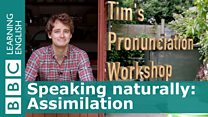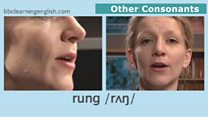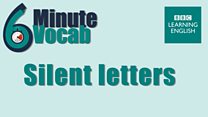Unit 30: Towards Advanced
Grammar, news, vocabulary and pronunciation
Select a unit
- 1 Towards advanced
- 2 Towards advanced
- 3 Towards advanced
- 4 Towards advanced
- 5 Towards advanced
- 6 Towards advanced
- 7 Towards advanced
- 8 Towards advanced
- 9 Towards Advanced
- 10 Towards Advanced
- 11 Towards Advanced
- 12 Towards Advanced
- 13 Towards Advanced
- 14 Towards Advanced
- 15 Towards Advanced
- 16 Towards Advanced
- 17 Towards Advanced
- 18 Towards Advanced
- 19 Towards Advanced
- 20 Towards Advanced
- 21 Towards Advanced
- 22 Towards Advanced
- 23 Towards Advanced
- 24 Towards Advanced
- 25 Towards Advanced
- 26 Towards Advanced
- 27 Towards Advanced
- 28 Towards Advanced
- 29 Towards Advanced
- 30 Towards Advanced
Session 5
Tim's Pronunciation Workshop: Summary
Tim reviews the Pronunciation Workshop series... and gives a final piece of advice
Activity 1
Tim's Pronunciation Workshop: Summary
Some final tips...
Tim's back in his pronunciation workshop for the last time. He's looking back at what we've covered over the series - and offering some last words of advice and encouragement.
To do
Take a look at the video, then try the activity to do some practice.
Watch the video and complete the activity

Tim
Hi. I'm Tim and this is my Pronunciation workshop. Here I'm going to show you how English is really spoken. Come on, let's go inside. Well, here we are in the pronunciation workshop for the final time. Today, let's look back on what we've covered in this series and I'll offer some final tips and words of advice. When we write English, each word is separate; there are spaces between the words. But, that's not how we speak English. If. We. Did. It. Might. Be. Easier. To. Understand. But. We. Would. Sound. Like. Robots. No. When we speak English, although there are some pauses, we mostly bump the words together. And when these words bump into each other certain things can happen that affect the sounds. We've learned that /t/ and /d/ sounds disappear between consonants:
Example
'Mashed potato' becomes /mæʃpəˈteɪtəʊ/.
Tim
Consonant sounds can link with vowel sounds:
Example
'An egg' becomes anegg.
Tim
Certain vowel sounds can link with certain other vowel sounds by adding sounds:
Example
'The shoe is…' becomes the shoe/w/is…
Tim
Two consonant sounds can join together, or twin.
Example
'It takes two' becomes /ɪt:eɪks tuː/.
Tim
Some sounds can change completely:
Example
'Green Park' /griːn pɑːk/ becomes /griːmpɑːk/.
Tim
Unstressed grammar words are often weak:
Example
'I'd have been late' becomes /aɪdəv bɪn leɪt/
Tim
And we've also seen how a little sound, schwa, is important to the rhythm of natural spoken English.
Example
'A piece of cake' /ə piːsə keɪk/
Tim
These are all features of what we call connected speech. Natural speech is full of these features. And for native speakers, these changes happen automatically. The more you can get used to listening to and speaking English, the more naturally they'll come to you too. But my advice is that the most important thing to pay attention to is schwa. Getting schwa in the right place is the first step to getting English pronunciation right. And that, for the last time, is about it from the pronunciation workshop. And always remember that if you want to learn more about pronunciation or other aspects of English, then please visit our website, bbclearningenglish.com. Thank you so much for watching this series and I'll see you soon. Bye bye! Erm, hello? Hello? Erm. I can't get out. What do I do? Help! Help! Oh. Somebody?
To do
So that's a look at some of the features of pronunciation that we've covered in this series. Now try this activity to get some more practice.
The Tim's Pronunciation Workshop game
8 Questions
Have another go at some of the quiz questions from episodes 1-29. How many will you get right? You decide...
Help
Activity
Have another go at some of the quiz questions from episodes 1-29. How many will you get right? You decide...
Hint
When 'from' is not stressed, the /ɒ/ changes to schwa, so /frɒm/ becomes /frəm/.Question 1 of 8

Help
Activity
Have another go at some of the quiz questions from episodes 1-29. How many will you get right? You decide...
Hint
When a word ends in an /nd/ sound and the next word begins with a /b/, /p/, /w/ or /m/, the /nd/ at the end will change to an /m/ as your mouth gets ready to say the next sound.Question 2 of 8

Help
Activity
Have another go at some of the quiz questions from episodes 1-29. How many will you get right? You decide...
Hint
When ‘have’ is contracted, it's often pronounced /əv/ after a consonant sound.Question 3 of 8

Help
Activity
Have another go at some of the quiz questions from episodes 1-29. How many will you get right? You decide...
Hint
When ‘the’ is followed by a word that begins with a consonant sound, it’s pronounced /ðə/. But if the next word begins with a vowel sound, 'the' is pronounced /ðɪː/.Question 4 of 8

Help
Activity
Have another go at some of the quiz questions from episodes 1-29. How many will you get right? You decide...
Hint
When a word ends in a vowel sound followed by a /t/, and the next word begins with a /t/ sound, the two /t/ sounds join together to make one slightly stronger /t/ sound.Question 5 of 8

Help
Activity
Have another go at some of the quiz questions from episodes 1-29. How many will you get right? You decide...
Hint
When a /t/ sound comes between two consonant sounds, it is often not pronounced. Listen carefully to 'wouldn't' and 'ticket'.Question 6 of 8

Help
Activity
Have another go at some of the quiz questions from episodes 1-29. How many will you get right? You decide...
Hint
When a word ends in /aɪ/, /ɪː/, /eɪ/ or /ɔɪ/, and the next word begins with a vowel, we can smooth out the connection between the words with a small /j/ sound.Question 7 of 8

Help
Activity
Have another go at some of the quiz questions from episodes 1-29. How many will you get right? You decide...
Hint
When a word ends in a /d/ sound and the next word begins with a /b/ sound, the /d/ changes to a /b/, which then merges with the /b/ from the following word.Question 8 of 8

Excellent! Great job! Bad luck! You scored:
End of Unit 30
Congratulations - you've reached the end of the Towards Advanced course. We hope you enjoyed it. If you want to keep studying and practicing English, we've got lots of great resources for you. Take a look at 6 Minute English to improve your listening and vocabulary skills - or why not sit back, relax and listen to a classic story on our Drama area? Brush up your knowledge of slang, idioms and up-to-the-minute expressions with The English We Speak or learn some great idioms and expressions that are popular in modern English with Shakespeare Speaks. Or why not try one of our other courses? See you soon!
Session Vocabulary
Summary
Over this series, we've looked at how:
/t/ and /d/ sounds disappear between consonants
'Mashed potato' becomes /mæʃpəˈteɪtəʊ/Consonant sounds can link with vowel sounds
'An egg' becomes 'anegg'Certain vowel sounds can link with certain other vowel sounds by adding sounds
'The shoe is…' becomes 'the shoe /w/ is…'Two consonant sounds can join together, or twin
'It takes two' becomes /ɪteɪks tuː/.Some sounds can change completely
'Green Park' /griːn pɑːk/ becomes /griːmpɑːk/.Unstressed grammar words are often weak
'I'd have been late' becomes /aɪdəv bɪn leɪt/Schwa is important to the rhythm of natural spoken English
'A piece of cake' /ə piːsə keɪk/


